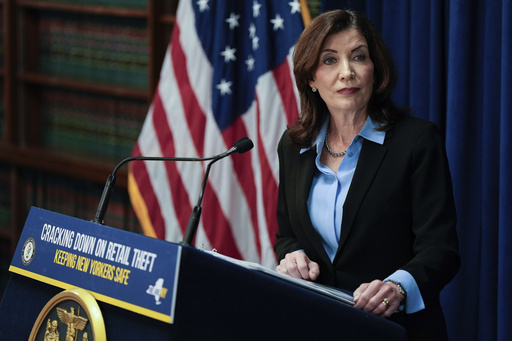A judge in Texas made a significant ruling on Thursday, ordering a doctor from New York, Dr. Maggie Carpenter, to pay over $100,000 in penalties for prescribing abortion pills to a woman living near Dallas. This decision could set a precedent concerning the “shield laws” established in Democratic-led states where abortion remains legal.
On the same day, New York Governor Kathy Hochul turned down Louisiana’s request to extradite Dr. Carpenter, who had been charged in that state for prescribing abortion pills to a minor. While Louisiana took action against Carpenter, Texas opted not to press criminal charges but instead accused her, through a lawsuit filed in December, of breaking state regulations by prescribing abortion medication through telemedicine. Texas is known for having some of the strictest abortion laws in the United States.
State District Judge Bryan Gantt imposed the fine on Carpenter and mandated that she cover attorney fees associated with the case. Gantt also issued an injunction preventing Carpenter from providing abortion medication to residents of Texas, citing her failure to appear in court despite being notified of the proceedings.
Earlier, Governor Hochul declared that she would not endorse Louisiana’s request to arrest and extradite Dr. Carpenter following the charges. “I will not approve an extradition order from the governor of Louisiana,” Hochul stated during a press conference in Manhattan. “Not now, not ever.” Further, she instructed law enforcement across New York not to comply with any out-of-state warrants linked to such charges.
Dr. Carpenter is a co-medical director and the founder of the Abortion Coalition for Telemedicine. Julie Kay, the executive director of the organization, asserted that the ruling from Texas does not impact shield laws, emphasizing that “patients can obtain medication abortion from licensed providers no matter where they reside.” The coalition criticized Louisiana’s attempts to extradite Carpenter, as this case marks the first known instance of criminal charges directed at a physician accused of prescribing abortion pills across state lines.
With the U.S. Supreme Court’s decision to overturn Roe v. Wade, the accessibility of abortion pills has become a central issue in the ongoing political and legal confrontations surrounding abortion rights in America. Both the cases in Texas and Louisiana will challenge New York’s shield law, which grants legal protection to doctors who provide abortion medication to individuals in conservative states where the procedure is heavily restricted. Other Democratic states have enacted similar protective laws.
In Louisiana, prosecutors in West Baton Rouge Parish have indicted Carpenter for allegedly breaching the state’s near-total abortion ban, which mandates that physicians found guilty of performing abortions—whether through pills or other means—could face sentences of up to 15 years in prison. Authorities in Louisiana noted that the young woman who received the pills suffered a medical emergency and needed to be hospitalized. The mother of the girl has also been charged and has surrendered to law enforcement.
Republican Governor Jeff Landry of Louisiana remarked in a video statement on Thursday, “There is only one right answer in this situation, and that is for this doctor to be extradited to Louisiana so she can face trial and justice can be realized.” His office did not respond promptly to inquiries following Hochul’s refusal to proceed with the extradition. Meanwhile, in the Texas case, Attorney General Ken Paxton stated that the 20-year-old who received the pills experienced complications and was eventually hospitalized, and it was only after this that the biological father of the unborn child became aware of the pregnancy and subsequent abortion.




